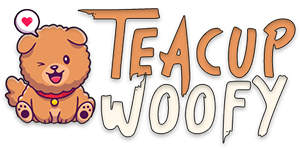When I first stumbled across the teacup Shih Tzu, my heart just about melted. These little furballs look like they were made to fit right into your lap, and honestly, into your life. But as adorable as they are, I quickly learned there’s more to them than just those big puppy eyes.
A teacup Shih Tzu is essentially a much smaller version of the traditional Shih Tzu, a breed that traces back over 1,000 years to Tibetan monasteries and Chinese palaces (AKC). While the standard Shih Tzu typically stands 9–11 inches tall and weighs 9–16 pounds, teacup versions usually measure only 5–7 inches and weigh around 6–8 pounds full grown.
They’re known for their long, silky coats (which need a lot of grooming), their affectionate temperaments, and their tendency to stick like glue to their humans. With an average lifespan of 12–15 years, these tiny pups can bring joy to your home for a long time, provided they get the right care and attention.
But here’s the kicker: “teacup” isn’t an official breed recognized by the AKC. It’s a marketing term breeders use for extra-small Shih Tzus. That means while they’re absolutely precious, they often come with extra health risks and, yes, extra vet bills.
Origin & History of the Teacup Shih Tzu

When I started digging into the history of the teacup Shih Tzu, I realized we moms aren’t just adopting a cute pup, we’re bringing home a piece of royal history. The Shih Tzu breed itself dates back more than 1,000 years, originally bred in Tibet and later adored by Chinese emperors and empresses. Their name literally means “little lion” in Mandarin, which makes sense since they were often kept as companions in palaces and temples.
By 1928, Lady Brownrigg introduced the first Shih Tzus into England, and from there, they spread across Europe. The UK Kennel Club recognized the breed in 1940, and the American Kennel Club followed in 1969.
Now here’s where the “teacup” twist comes in. Unlike the standard Shih Tzu, which grows to 9–16 pounds, the teacup Shih Tzu was developed much later through selective breeding for extra-small size. These little guys usually stay under 8 pounds and stand just 5–7 inches tall (dogacademy.org). The term isn’t officially recognized by kennel clubs, but breeders and families often use it to describe the tiniest pups in a litter.
Size & Appearance of Teacup Shih Tzu Puppies

When I first saw a teacup Shih Tzu puppy, I thought, “How on earth can something so tiny even exist?” These little bundles of fluff are basically pocket-sized versions of the regular Shih Tzu. Full grown, they usually stand about 5–7 inches tall and weigh just 6–8 pounds.
Coat Variants
One of the things I adore about them is their luxurious double coat. It’s long, silky, and can be straight or slightly wavy. Teacup Shih Tzus come in a rainbow of shades:
- Solid (black, white, red, liver, gold)
- Bi-color (black & white, gold & white, etc.)
- Tri-color and even brindle patterns.
But here’s the deal: that gorgeous hair means grooming isn’t optional, it’s mandatory. Expect daily brushing and regular trims to keep mats away.
Growth & Weight Chart
Here’s a snapshot of how teacup Shih Tzu puppies grow compared to their standard cousins:
| Age | Male Weight / Height | Female Weight / Height |
| 8 weeks | 1.5–2 lbs, ~3–4 in | 1.5–2 lbs, ~3–4 in |
| 3 months | 3–5 lbs, ~5 in | 2.5–4.5 lbs, ~4–5 in |
| 6 months | 5–8 lbs, ~6–7 in | 4.5–7 lbs, ~6 in |
| 9 months | 6–9 lbs, ~6–7 in | 5–8 lbs, ~6–7 in |
| 12 months (adult) | 6–8 lbs, ~7 in | 5–7 lbs, ~6–7 in |
When Will a Teacup Shih Tzu Stop Growing?
From what I’ve learned (and what breeders confirm), most teacup Shih Tzu puppies hit their full height and almost full weight by around 9–10 months. After that, they may “fill out” a little, but by 12 months they’re considered adults (iHeartDogs).
So if you’re wondering when your tiny ball of fluff will stop growing, it’s safe to say by their first birthday you’ll have a teacup Shih Tzu adult on your hands.
What Is the Size of a Full-Grown Teacup Shih Tzu?
A full size, full grown teacup Shih Tzu is still adorably pint-sized compared to the standard breed:
- Height: about 5–7 inches tall at the shoulder
- Weight: usually 6–8 pounds, some staying closer to 5 lbs if extra tiny
- Body type: compact, sturdy frame with a short muzzle and big round eyes
- Coat: that signature long, silky double coat that often needs professional grooming
For comparison, a standard Shih Tzu grows 9–11 inches tall and weighs 9–16 pounds So yes, your teacup Shih Tzu full grown will always look like a permanent puppy, just be aware that their small size makes them more fragile.
Breed Overview: Teacup Shih Tzu

Whenever I talk about the teacup Shih Tzu, I like to think of them as the “forever baby” version of the Shih Tzu. They stay small, cuddly, and look like living teddy bears. But let’s break down what makes them unique.
- Size & Group: The teacup Shih Tzu falls into the Toy group, designed for companionship rather than work. Unlike standard Shih Tzus, which weigh 9–16 lbs, teacups usually max out at 6–8 lbs.
- Height & Weight: Adults grow about 5–7 inches tall, making them one of the tiniest toy breeds.
- Coat & Coat Colors: They have that signature long, silky double coat, which comes in every shade from gold, liver, and red to black, white, brindle, and multi-color combinations.
- Lifespan: A healthy teacup Shih Tzu can live 12–15 years, but being smaller sometimes brings added health risks that can shorten that span
- Temperament: Sweet, loyal, and cheerful. They’re perfect lap dogs, though they can be a little stubborn when training. With kids, they need gentle handling because of their small size.
- Hypoallergenic: Often called “hypoallergenic” because they shed very little, but no dog is 100% allergy-free
- Origin: The Shih Tzu’s roots go back over 1,000 years to Tibet and Imperial China, where they were pampered by royalty. The “teacup” version is a modern size variation created by selective breeding.
- Price: Buying a teacup Shih Tzu from a breeder often costs $1,500–$2,000, with “imperial” or rare-colored pups reaching $8,975 and up.
- Average Monthly Expenses: Expect to budget $150–$250 per month for food, vet visits, and grooming. Food is about $20–40, grooming can run $40–60, and vet care averages $30–50 per month.
Breed Characteristics of the Teacup Shih Tzu
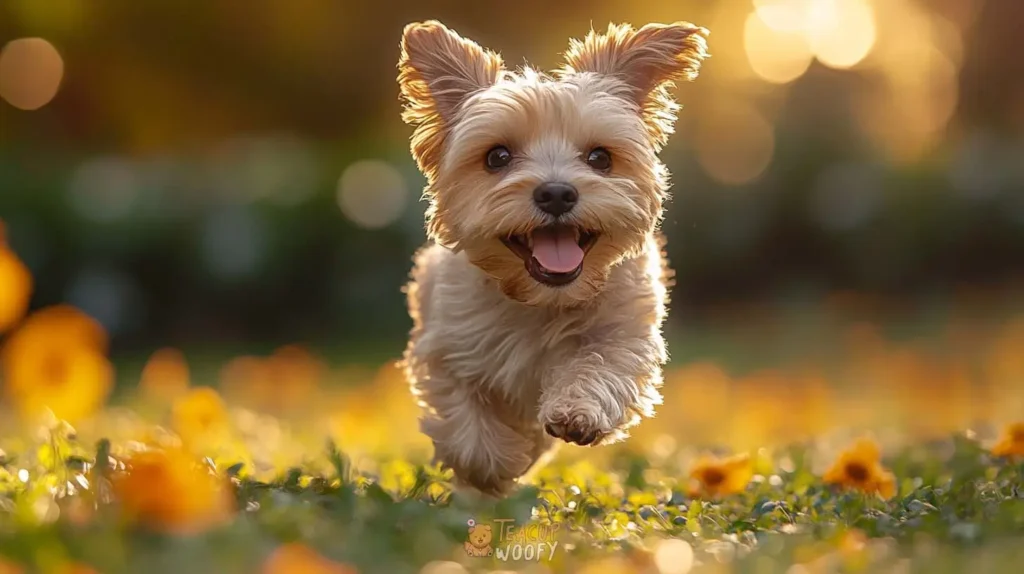
When I think about the teacup Shih Tzu, I picture a little shadow that follows me from the kitchen to the couch. These pups are tiny, but their personalities? Oh, they’re huge. Let’s break it down.
- Affection Level: Off the charts. They’re true lap dogs who love being held and spoiled. If you want a pup that sticks close, this is it.
- Friendliness: Very friendly with family and usually strangers, though some can be shy at first. Socialization as a puppy helps a ton.
- Kid-Friendly: Yes, but with a warning. Their tiny bodies are fragile, so younger kids need supervision. Think of them as a “gentle play only” pup (petmd.com).
- Pet-Friendly: Generally good with other dogs and cats if introduced early. They’re not usually aggressive.
- Exercise Needs: Pretty low. A couple of 15–20 minute walks and some playtime indoors are enough.
- Playfulness: Very playful. They love toys, gentle tug games, and running around the living room with the kids.
- Energy Level: Moderate. They’re not hyper like some small breeds, but they do have bursts of puppy energy followed by long naps.
- Health: Here’s the tough part, teacups are more prone to issues like breathing problems, hypoglycemia, dental crowding, and fragile bones. Vet visits are important.
- Sociability: High. These pups do not like being left alone for long. They thrive in homes where someone is around most of the day.
- Trainability: Fair. They’re smart but stubborn, which means you’ll need patience and lots of treats.
- Intelligence: Above average for toy breeds. They pick up tricks and routines quickly, but sometimes act like they know better than you.
- Tendency to Bark: Moderate. They’ll bark to alert you or if bored, but with training, you can keep it under control.
- Amount of Shedding: Low. They shed very little, but because their hair grows long, you’ll notice tangles if you don’t brush often.
Teacup Shih Tzu Temperament and Personality

If I had to describe the teacup Shih Tzu in one word, it would be velcro. These little pups attach themselves to you like glue, and honestly, I don’t mind one bit. They love being close, whether I’m folding laundry, binge-watching Netflix, or sneaking into the kitchen for a late-night snack.
Teacup Shih Tzus are naturally affectionate, cheerful, and loyal. They thrive on attention and often act more like tiny companions than independent dogs. Because they were bred as lap dogs for royalty, it’s no surprise they still carry that “pamper me” vibe.
Their personality is playful but gentle. They enjoy short bursts of energy, chasing toys or playing with the kids, followed by long naps on the couch. Don’t expect marathon runs, though; their small size and short muzzle make them more suited for cozy walks and indoor play.
On the flip side, they can be a little stubborn during training. I remember trying to housetrain a friend’s teacup Shih Tzu, let’s just say patience and treats became my new best friends. Positive reinforcement works wonders, but you have to stay consistent.
Overall, a teacup Shih Tzu’s temperament makes them ideal for families, seniors, or anyone looking for a loyal little shadow. Just be prepared for a pup that wants to be spoiled like the royal companion they were bred to be.
Teacup Shih Tzu Behavior
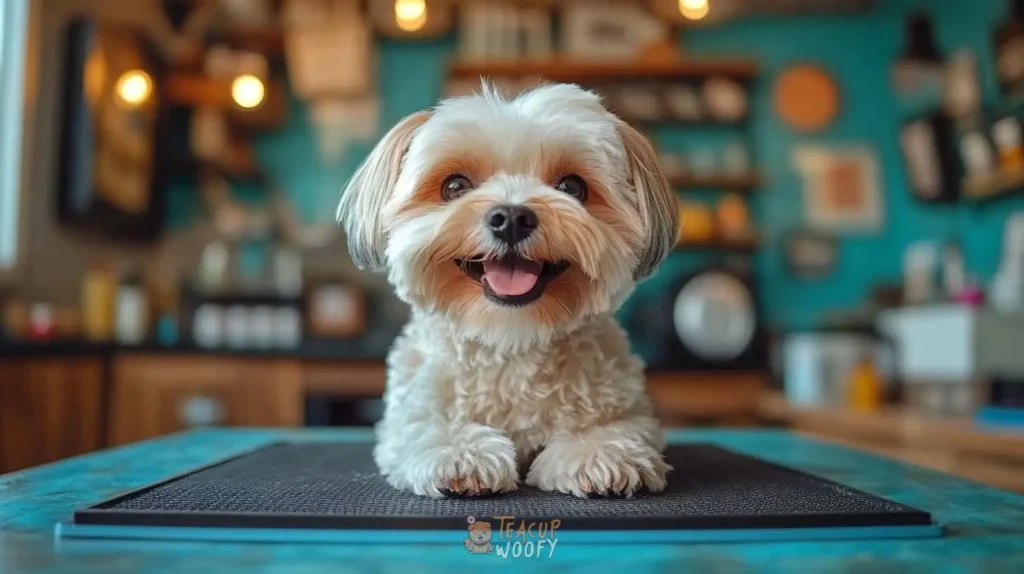
Living with a teacup Shih Tzu is kind of like having a toddler that never quite grows up, sweet, playful, and sometimes a little bossy. These pups are generally gentle and calm indoors, but they also have a mischievous streak that comes out during play.
They’re companion dogs at heart, which means they crave being near their people. If I step out of the room, mine is usually right on my heels. Left alone too long, they can develop separation anxiety, so this isn’t the breed for someone gone all day.
Teacup Shih Tzus are usually well-mannered with kids and other pets, though their small size makes them fragile. I always tell parents, supervise playtime, because one rough hug from a toddler could be risky.
When it comes to behavior quirks, expect a bit of stubbornness. House training can take longer, and sometimes they’ll test the limits just to see if you’ll give in. On the plus side, they’re not overly aggressive or destructive, and their barking level is moderate, they’ll alert you to visitors or noises, but they’re not yappy if properly trained.
In short, the behavior of a teacup Shih Tzu is affectionate, people-oriented, playful, and just a little dramatic, which, honestly, is part of their charm.
Adopt or Shop: What’s the Real Teacup Shih Tzu Price?

When I first started looking to buy a teacup Shih Tzu, I was shocked by the range in prices. Some people advertise teacup Shih Tzu puppies for sale for under $500, while reputable breeders often charge in the thousands. The truth? It really depends on where you’re looking and what you’re willing to invest.
The average teacup Shih Tzu price from a trusted breeder usually falls between $1,500 and $2,000, but specialty pups, the tiny “imperials” or rare coat colors, can run as high as $8,975+. If you’re hoping for a deal, some rescues and shelters have Shih Tzus (not always teacup size) for as little as $100–$500, which is a much lower teacup Shih Tzu cost upfront.
Here’s what I’d check before buying:
- Health certificates and vaccination records from the breeder
- Proof of the puppy’s size (since “teacup” isn’t officially recognized)
- Reputation of the breeder, avoid puppy mills at all costs
- Lifetime costs, not just the purchase price (vet bills, grooming, food)
And here’s my mom tip: don’t get dazzled by the lowest price when you see teacup Shih Tzu puppies for sale online. Cheap often means corners are being cut, whether on health, breeding practices, or care. It’s better to pay more upfront for a healthy, happy pup than spend triple later on vet bills.
Monthly Expenses of a Teacup Shih Tzu

When I first looked past the teacup Shih Tzu price, I realized the real budget question was: how much will this pup cost me every single month? Here’s the breakdown based on food, vet visits, and grooming.
Food
Even though a teacup Shih Tzu eats tiny portions, quality food matters. High-end small-breed kibble or wet food runs about $20–$40 per month, depending on the brand and whether you add extras like treats or supplements.
Veterinary
Vet costs are where teacups can surprise you. Routine care, vaccines, flea/tick prevention, and checkups, averages $30–$50 per month. But since teacup Shih Tzus are more prone to health issues (like breathing problems or low blood sugar), I’d suggest setting aside extra. Realistically, some months may cost way more if emergencies pop up.
Grooming
That silky double coat isn’t low-maintenance. A professional groomer visit every 4–6 weeks can cost $40–$60 per session, which averages out to $50–$70 per month. If you learn some DIY grooming at home (like nail trims or brushing daily), you can shave costs a bit, but trust me, you’ll still want a pro for the big cuts .
Total Teacup Shih Tzu Cost Per Month: Plan for $150–$250 covering food, vet, and grooming. That doesn’t even include toys, training, or emergencies, so as a mom, I always say build a little cushion into your budget.
Diet and Nutrition for Teacup Shih Tzus
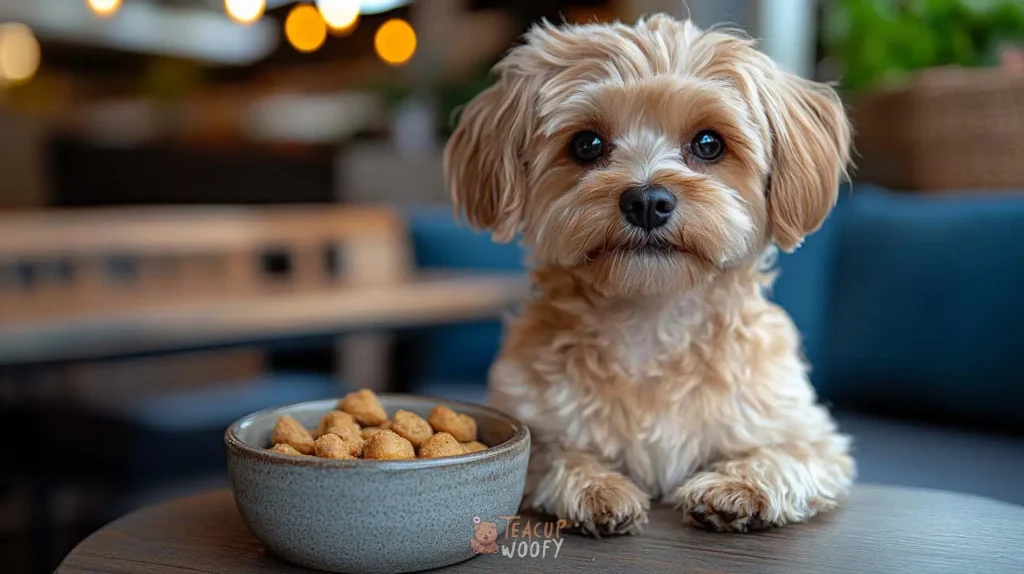
When I brought home my first tiny pup, I quickly learned that feeding a Shih Tzu teacup dog isn’t just about filling a bowl, it’s about balancing their little bodies with the right nutrients. Because of their extra-small size, their diet needs to be carefully managed.
Monthly Food Expenses
Even with small appetites, good food adds up. Expect to spend about $20–$40 per month on high-quality small-breed kibble or wet food, depending on the brand and whether you mix in treats or supplements.
Essential Nutrients
To keep your teacup Shih Tzu healthy and energetic, their diet should include:
- Protein: chicken, turkey, lamb, or fish for muscle growth
- Healthy fats: omega-3 and omega-6 for skin and coat health
- Carbs: brown rice, sweet potatoes, or oats for energy
- Fiber: veggies like carrots or green beans for digestion
- Vitamins & minerals: calcium, iron, and vitamin A for bone and immune support
Foods for Teacup Shih Tzu Puppies
Puppies need food rich in protein and fat to fuel their growth. Look for puppy formulas labeled for toy or small breeds.
- How much to feed: ¼ to ½ cup of food per day, split into 3–4 small meals to prevent hypoglycemia (low blood sugar).
Foods for Adult Teacup Shih Tzus
Adults need balanced, portion-controlled meals to stay lean. Stick to small-breed adult formulas with fewer calories than puppy food.
- How much to feed: ½ to ¾ cup per day, split into 2–3 meals. Adjust portions if your pup gains or loses weight.
Daily Calorie Needs
A full-grown teacup Shih Tzu typically needs around 200–300 calories per day, depending on age, activity level, and health. Puppies may need slightly more, since they’re growing and burning energy.
Macro-Nutrient Breakdown
- Protein: 22–25% of diet
- Fats: 8–15% of diet
- Carbs & Fiber: balance to provide steady energy and digestion support
Never Feed These Foods to Teacup Shih Tzus
Some human foods can be toxic. Never give your dog:
- Chocolate
- Onions & garlic
- Grapes & raisins
- Avocados
- Caffeine or alcohol
- Xylitol (found in sugar-free gum and candy)
Nutritional Tips for Teacup Shih Tzus
- Stick to small, frequent meals to avoid blood sugar drops.
- Always provide fresh water in a shallow bowl they can reach easily.
- Use healthy snacks like carrot sticks, apple slices (without seeds), or vet-approved small-breed treats.
- Monitor their weight monthly, extra pounds can stress their tiny joints.
- Consider vet-approved supplements for skin, coat, and joints if needed.
Health of Teacup Shih Tzus

When I started looking at the teacup Shih Tzu cost, I realized the purchase price is just the beginning. Their health needs can really add up, especially because smaller dogs often come with special care requirements.
Health Average Monthly Expenses
On average, expect to spend $30–$50 per month on routine vet care, flea/tick prevention, and basic medications. But because teacup Shih Tzus are more fragile, I’d recommend budgeting closer to $70–$100 per month when you factor in extra checkups and possible emergencies.
Overall Well-Being
These little dogs are happiest in stable, loving homes where they aren’t left alone for long. Their well-being depends on a balance of:
- Gentle exercise (short walks, indoor play)
- Proper nutrition (small, frequent meals to prevent hypoglycemia)
- Regular grooming to keep skin and coat healthy
- Lots of human interaction (they’re true lap dogs)
Common Health Problems
Because of their size and flat faces, teacup Shih Tzus are prone to certain issues:
- Brachycephalic syndrome (breathing problems from short muzzles)
- Hypoglycemia (low blood sugar, especially in puppies)
- Dental problems (crowded teeth)
- Eye conditions like cataracts or dry eye
- Luxating patella (slipped kneecaps)
- Liver shunts in rare but severe cases.
Energy Level
Their energy level is moderate, they’ll happily bounce around during playtime, but they’re just as content napping beside you. They’re not marathon dogs; two short walks a day plus some indoor play usually does the trick.
Recognizing Stress
A stressed teacup Shih Tzu might:
- Hide or avoid people
- Pant or whine excessively
- Lose appetite
- Show tummy troubles (loose stool)
If I notice these signs, I usually slow things down: quiet time, gentle cuddles, and sometimes a vet call if symptoms linger.
Medical Care & Vaccinations
Like any dog, they need a core vaccination schedule:
- 6–8 weeks: distemper, parvovirus
- 10–12 weeks: DHPP combo, possible bordetella
- 16–18 weeks: rabies, DHPP booster
- Yearly / as needed: leptospirosis, canine flu, heartworm tests.
Caring for a Senior Teacup Shih Tzu
Senior dogs (around age 9+) need extra TLC:
- Switch to senior dog food with fewer calories but more joint support
- More frequent vet visits (every 6 months instead of yearly)
- Daily joint supplements (ask your vet)
- Softer bedding to ease pressure on joints
- Gentle exercise to keep muscles strong without overdoing it
Care for Teacup Shih Tzus
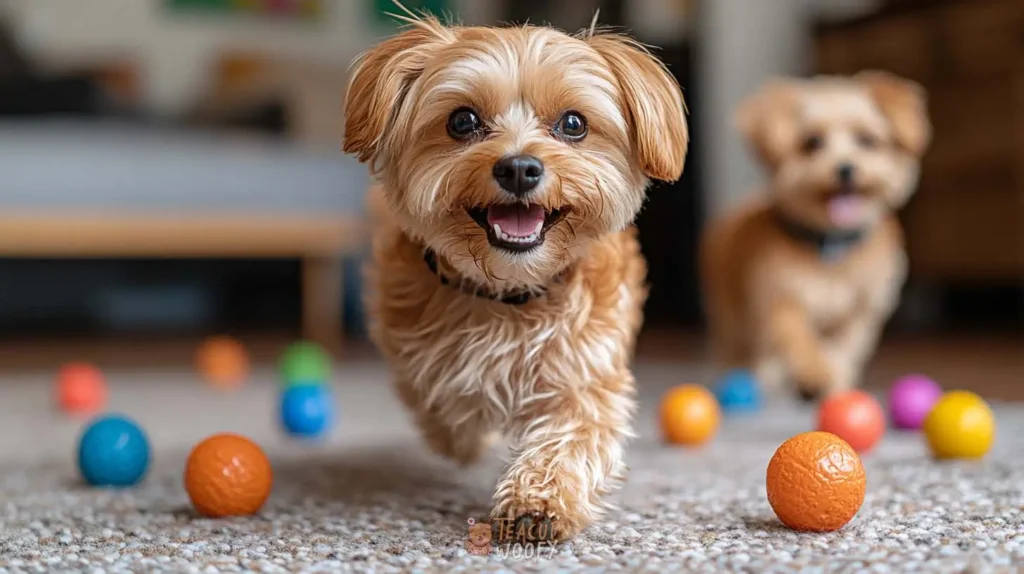
Taking care of Shih Tzu teacup dogs is a lot like caring for a toddler, they need structure, playtime, and naps, all in balance. Exercise is a big part of their overall health, but don’t let their tiny size fool you. These pups have bursts of energy that can surprise you.
Exercise & Energy Level
Even though teacup Shih Tzus are small, they’re not lazy. Their energy level is moderate to high in short bursts. You’ll often see them zooming around the living room, chasing toys, and then flopping on the couch like they ran a marathon.
Intensity
Their exercise intensity is low to moderate. They don’t need miles of running, and honestly, their little legs can’t handle it. Instead, think gentle walks, short games of fetch, or tug-of-war with a soft toy.
Exercise Needs
A teacup Shih Tzu’s exercise needs are pretty manageable:
- Two short walks a day (10–15 minutes each)
- Indoor playtime (toys, games, or gentle chasing)
- Training sessions (mental stimulation counts as exercise too)
This combo keeps them happy without overexerting their small frames.
Potential for Playfulness
These dogs are natural clowns. They love toys, silly games, and family interaction. My friend’s teacup Shih Tzu used to pull socks out of the laundry basket just to get a laugh. They’re playful, but also know when it’s time to settle down for a cuddle.
Example Exercise Routine
Here’s a simple daily routine for a teacup Shih Tzu:
- Morning: 10-minute walk around the block
- Afternoon: Indoor play (tug toy, fetch, or puzzle feeder)
- Evening: Another short 10–15 minute stroll
- Bonus: Training time with treats (sit, stay, spin, they love showing off)
Shedding in Teacup Shih Tzus
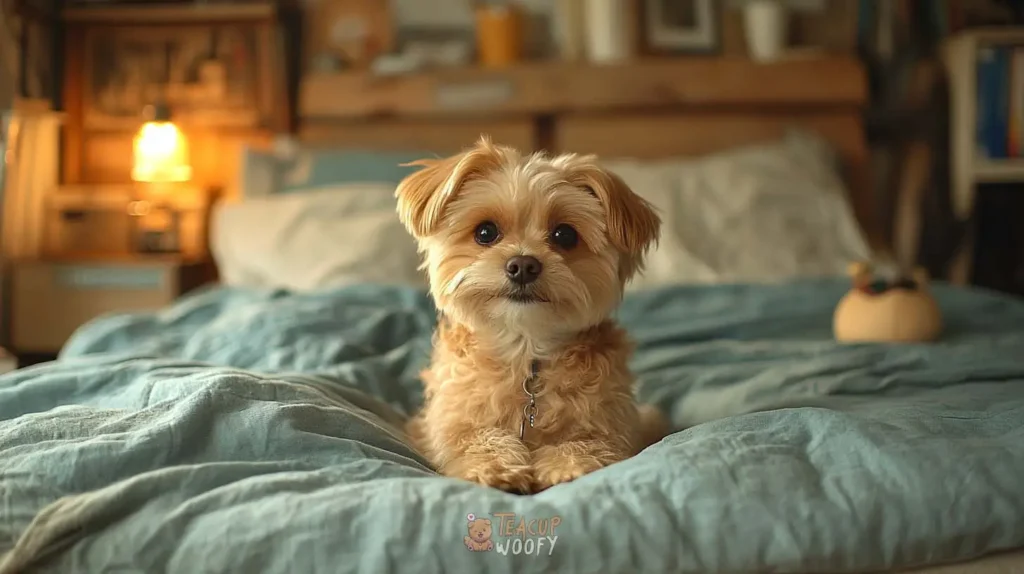
One of the things I love most about teacup Shih Tzu dogs is that they’re not heavy shedders. Their silky double coat grows more like human hair than fur, which means most of the loose hair gets caught in the coat instead of ending up all over your couch.
Shedding Level
The shedding level is low, especially compared to breeds like Huskies or German Shepherds. But, and here’s the catch, low shedding doesn’t mean low maintenance. Because their hair keeps growing, it tangles and mats if you don’t brush them regularly. Daily brushing and professional grooming every 4–6 weeks keeps shedding under control and their coat looking gorgeous.
Grooming Teacup Shih Tzus
If there’s one thing I learned fast, it’s that grooming a teacup Shih Tzu is not optional, it’s survival. Their long silky coats are stunning, but they tangle faster than my kids’ hair on a windy day. Grooming is where you’ll spend a big chunk of your time (and budget).
Average Monthly Expenses
Professional grooming every 4–6 weeks costs about $50–$70 per month, depending on where you live and the style you choose. Add in brushes, shampoos, wipes, and nail clippers, and you’re looking at $60–$80 monthly if you combine home care with salon visits.
Hygienic Checklist
Here’s what I keep on my “puppy hygiene” checklist:
- Daily brushing
- Bath every 3–4 weeks (or sooner if muddy paws strike)
- Wipe face and eyes daily
- Clean ears weekly
- Trim nails every 3–4 weeks
- Sanitary trim (around bum and belly) as needed
Benefits of Grooming
Regular grooming isn’t just about looking cute, it:
- Prevents painful mats and tangles
- Reduces skin infections
- Keeps eyes clear from irritation
- Helps spot health issues early (like lumps or rashes)
Skin Care
Teacup Shih Tzus have sensitive skin. I stick to hypoallergenic shampoos, avoid harsh chemicals, and moisturize with vet-approved conditioners if dryness shows up. Watch for redness or itching, signs of allergies.
Coat Care
Their double coat is long, dense, and silky. Brush daily with a slicker brush to keep mats away. Many moms (me included) opt for a “puppy cut”, shorter hair that’s easier to maintain.
Eye Care
Those big round eyes are adorable, but prone to tearing. I gently wipe with a damp cloth or dog-safe wipes daily. Tear stains are common, so keeping the face clean is a must.
Ear Care
Their floppy ears can trap moisture, which means infections are a risk. I clean the ears weekly with vet-approved solutions and always dry them well after baths.
Nail Care
Overgrown nails are painful and can affect walking. I trim every 3–4 weeks or let the groomer handle it. Quick mom tip: if you hear “click-click” on the floor, it’s nail time.
Adaptability of Teacup Shih Tzus
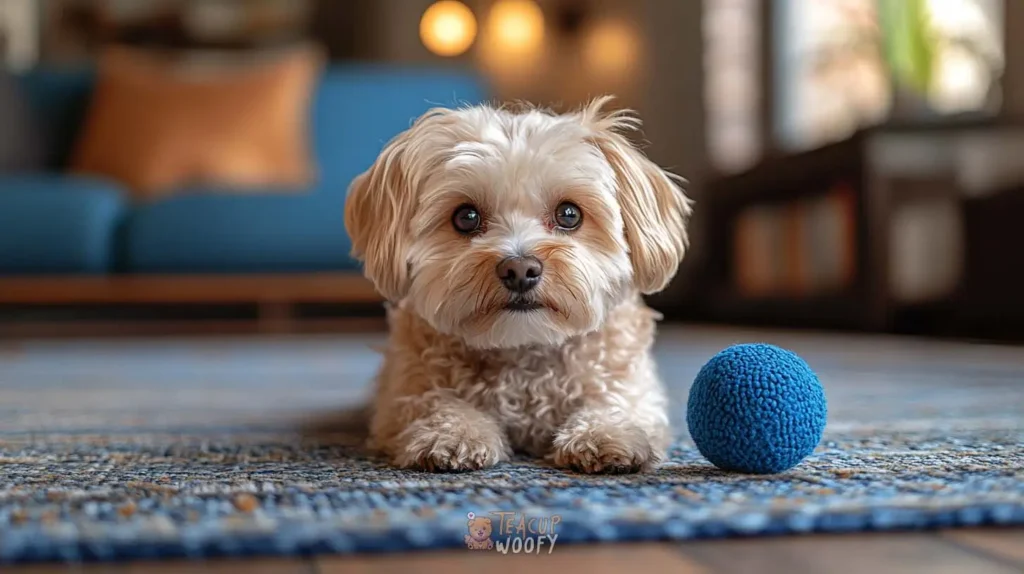
One of the reasons I fell in love with teacup Shih Tzu dogs is how easily they fit into family life. They’re small, portable, and happy to curl up on your lap, but like any breed, they’ve got quirks when it comes to adapting.
Adapts Well to Apartment Living
Absolutely yes. With their tiny size (5–7 inches tall, 6–8 lbs full grown), they’re perfect for small apartments. They don’t need a yard, just short walks and indoor play.
Tendency to Bark or Howl
Their barking level is moderate. They’ll sound the alarm if someone’s at the door, but they’re not nonstop yappers. Training early helps keep the noise down.
Good for Novice Dog Owners
I’d say yes, with a little patience. They’re sweet and eager to please, but can be stubborn with house training. First-time owners should be ready for consistency and lots of positive reinforcement.
Sensitivity Level
Teacup Shih Tzus are very sensitive. Harsh tones or chaotic environments can stress them out. They do best in calm homes where gentle handling is the norm.
Tolerates Being Alone
This is where they struggle. They’re velcro pups, too much alone time can lead to anxiety. If your schedule keeps you out all day, they may not be the right match.
Tolerates Cold Weather
Not really. With their small size and short muzzles, they get cold quickly. In winter, a warm doggy sweater is a must.
Tolerates Hot Weather
They don’t handle heat well either. Because they’re brachycephalic (flat-faced), they can overheat easily. Always keep them indoors on hot days, with water and fans or AC.
All-Around Friendliness of Shih Tzu Teacup Dogs

If you ask me, shih tzu teacup dogs are like little social butterflies wrapped in fur. They love people, they love attention, and they want to be part of everything going on at home. Let’s see how they stack up in the friendliness department.
Best Family Dogs
I’d put them high on the list of best family dogs, with one caveat. Their tiny size means they’re fragile, so families with older kids are the best fit. These pups thrive in households where they get cuddles, playtime, and calm energy.
Kid-Friendly
Yes, they’re affectionate with children, but because teacup Shih Tzus usually weigh only 6–8 lbs full grown, little kids need supervision. One rough hug or tumble could hurt them. Gentle play is the golden rule.
Dog Friendly
Most shih tzu teacup dogs are friendly with other dogs, especially if raised with them. They’re not aggressive, but because they’re so small, they can easily get hurt in rough play with bigger breeds. Playdates with dogs their own size are safest.
Friendly Towards Strangers
These pups are usually warm and welcoming to guests. Mine loves greeting visitors at the door like she’s the hostess of the house. While some can be shy at first, with proper socialization they’re typically very people-friendly.
Trainability of Teacup Shih Tzus
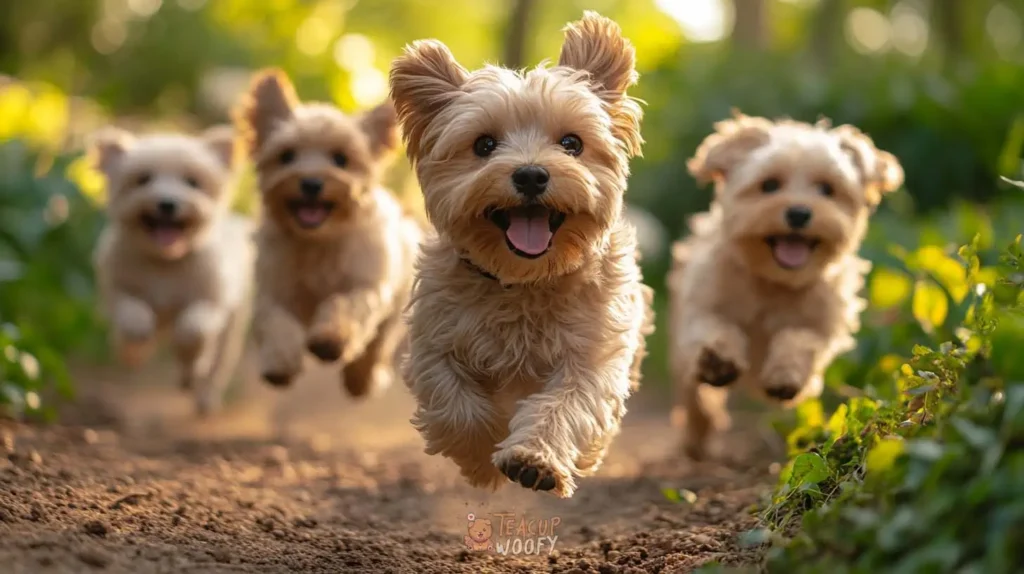
Training a teacup Shih Tzu is a little like teaching a toddler, they’re smart, but they definitely test your patience. With the right approach, though, these little dogs can learn quickly.
Easy to Train
They’re not the hardest breed to train, but they’re not pushovers either. Teacup Shih Tzus can be stubborn, especially with potty training. Positive reinforcement (think treats and praise) works way better than scolding. Consistency is the secret sauce.
Intelligence
Don’t let the big eyes fool you, they’re smart cookies. Shih Tzus were bred as companion dogs, so they learn routines fast. Teaching simple commands like “sit,” “stay,” and even fun tricks like “spin” comes naturally with short, upbeat training sessions.
Potential for Mouthiness
Since they’re tiny, they don’t usually nip hard, but puppies may get mouthy when teething. Redirecting them with chew toys solves this quickly. They’re not known for destructive chewing, which is a big mom win.
Prey Drive
Their prey drive is low. These pups aren’t out chasing squirrels like terriers. A teacup Shih Tzu is more likely to chase a squeaky toy than wildlife.
Wanderlust Potential
Again, pretty low. They’re velcro dogs, they’d rather stick to your side than run off. Still, I always keep mine on a leash outdoors. Their small size makes them vulnerable, and they could easily get lost or hurt if they wandered.
Teacup Shih Tzu Puppies

When I first held a teacup Shih Tzu puppy, I honestly thought I was cradling a stuffed animal. These little pups are so tiny and delicate that it feels like you’re holding a ball of fluff with eyes.
Puppies’ Size
A teacup Shih Tzu puppy usually weighs just 1.5–2 lbs at 8 weeks old, and they can fit right in the palm of your hand. As they grow, they stay much smaller than standard Shih Tzus, topping out at 6–8 lbs full grown and standing 5–7 inches tall.
Because of their fragile size, they need extra care as puppies. That means feeding them 3–4 small meals a day to prevent low blood sugar, keeping them warm, and avoiding rough play.
Teacup Puppy Charm
Puppies shih tzu teacup are famous for their playful personalities. They love toys, cuddles, and will quickly bond to their humans. Their tiny size makes them extra portable, but also extra fragile. Families with very young kids should be cautious.
Male vs Female Teacup Shih Tzus

When I was first considering a teacup Shih Tzu puppy, I kept asking myself: should I get a boy or a girl? The truth is, both are sweet little companions, but there are some differences worth knowing before you decide.
Male Teacup Shih Tzus
- Tend to be a little more affectionate and clingy, true lap dogs that follow you everywhere.
- Often more playful and goofy, which makes them fun for families with kids.
- Sometimes a bit more stubborn during training, especially with potty habits. Neutering early usually helps with marking behaviors.
- Size: males may weigh slightly more, averaging 6–8 lbs full grown.
Female Teacup Shih Tzus
- Usually more independent than males, though still very loving.
- Can be easier to house train and may mature faster in behavior.
- Sometimes more reserved with strangers, but this varies by personality.
- Size: females are often a touch smaller, averaging 5–7 lbs full grown.
Which One Is Best for You?
Honestly, it depends on your lifestyle. If you want a playful, silly shadow, a male may fit best. If you prefer a calmer, slightly more independent pup, a female might be a better match. Either way, both genders of teacup Shih Tzu puppies make wonderful, loyal companions.
What to Know Before You Buy or Rehome a Teacup Shih Tzu
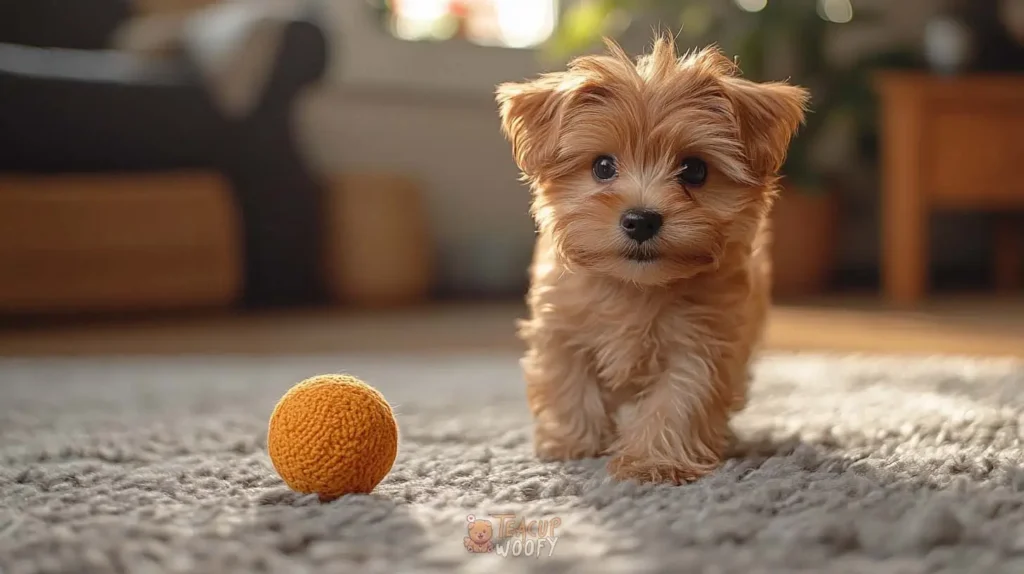
Before you rush out to buy a teacup Shih Tzu, there are a few things every family should think about. Trust me, these little pups are irresistible, but bringing one home is a big commitment that goes beyond the initial teacup Shih Tzu price.
The Real Cost
The average teacup Shih Tzu cost from a breeder is usually $1,500–$2,000, but rare colors or “imperial” sizes can shoot the price up to $8,975+. Adoption, on the other hand, may only run you $100–$500, though you might not always find true teacup sizes through rescues. Either way, don’t just look at the purchase price, factor in $150–$250 per month in ongoing care for food, grooming, and vet visits.
Health and Lifestyle Needs
Because they’re so small, teacup Shih Tzu puppies for sale often come with extra health risks like low blood sugar, fragile bones, and breathing issues. That means you’ll need to:
- Feed them small meals throughout the day
- Supervise play, especially with kids or larger dogs
- Schedule regular vet checkups to stay ahead of health problems
Red Flags When Buying
When shopping for a pup, here’s what I always look out for:
- Breeders who won’t let you meet the parents or see where the puppies are raised
- Prices that seem too good to be true (cheap often means poor breeding practices)
- No vaccination records or health certificates
- Pressure to buy quickly without asking questions
Top 9 Facts About the Teacup Shih Tzu
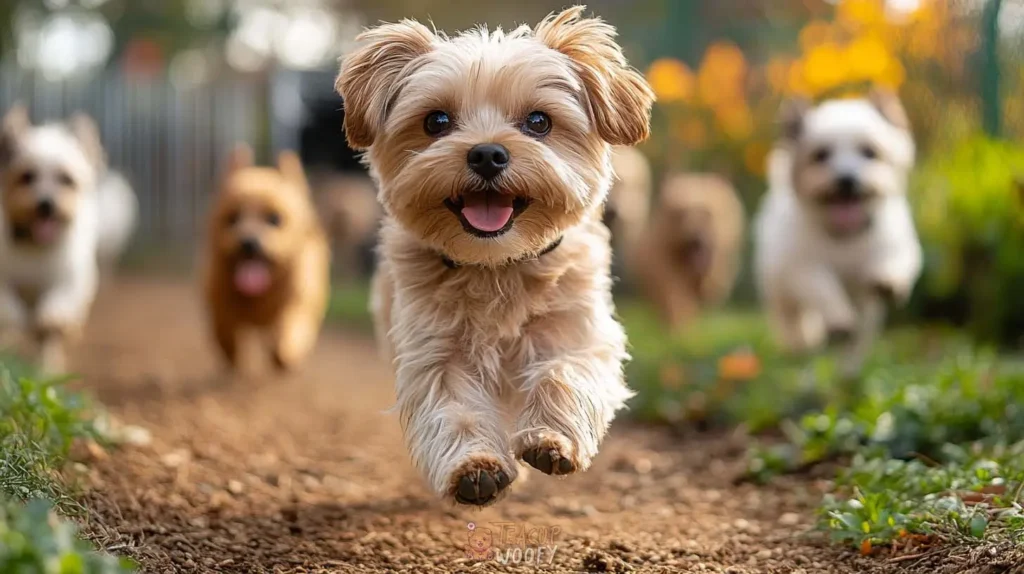
I love collecting little tidbits about teacup Shih Tzus, they make great conversation starters when someone asks about your tiny fluff ball. Here are some of my favorite facts:
- Royal roots: Shih Tzus were bred as companions for Chinese royalty more than 1,000 years ago
- Pocket size: A full-grown teacup stands only 5–7 inches tall and weighs 6–8 lbs, about the size of a bag of sugar.
- Professional nappers: They need 12–14 hours of sleep a day, so don’t be surprised if they snooze half the afternoon.
- “Forever puppy” look: Thanks to their tiny size and round faces, they often look like puppies even as adults.
- Grooming queens: Their coat grows continuously, just like human hair, so daily brushing is a must to prevent tangles.
- Velcro dogs: Teacup Shih Tzus love sticking close, they’ll follow you from the bathroom to the kitchen without shame.
- Pricey pups: The teacup Shih Tzu price can range from $1,500–$8,975+, depending on breeder and rarity.
- Heat-sensitive: Because of their flat faces, they’re prone to overheating, so air conditioning is your best friend in summer.
- Great apartment dogs: Their small size and low exercise needs make them ideal for city living.
Teacup Shih Tzu Summary
At the end of the day, a teacup Shih Tzu is more than just a pet, it’s a tiny family member with a royal history and a huge personality. They may only weigh 6–8 lbs full grown, but the love and joy they bring easily outweigh their size. Between their silky coats, playful spirits, and loyal temperaments, these pups are built for companionship.
Yes, the teacup Shih Tzu price can be high, and the monthly care adds up, but if you’re ready for the commitment, the reward is a sweet, affectionate little shadow who will brighten your home for years to come. For families, singles, or seniors who want a cuddle buddy, the teacup Shih Tzu is truly a lap-sized treasure.
Frequently Asked Questions:
How big does a teacup Shih Tzu get?
A full-grown teacup Shih Tzu usually stands about 5-7 inches tall and weighs 6-8 pounds, which is smaller than the standard Shih Tzu.
What is the average lifespan of a teacup Shih Tzu?
With proper care, a teacup Shih Tzu often lives 10-15 years.
What is the teacup Shih Tzu price or cost?
The cost to buy a teacup Shih Tzu from a reputable breeder tends to range from $1,500-$2,500, although rare colors or very small “imperial” pups can cost more. (Exact price depends a lot on breeder, location, health guarantees etc.)
